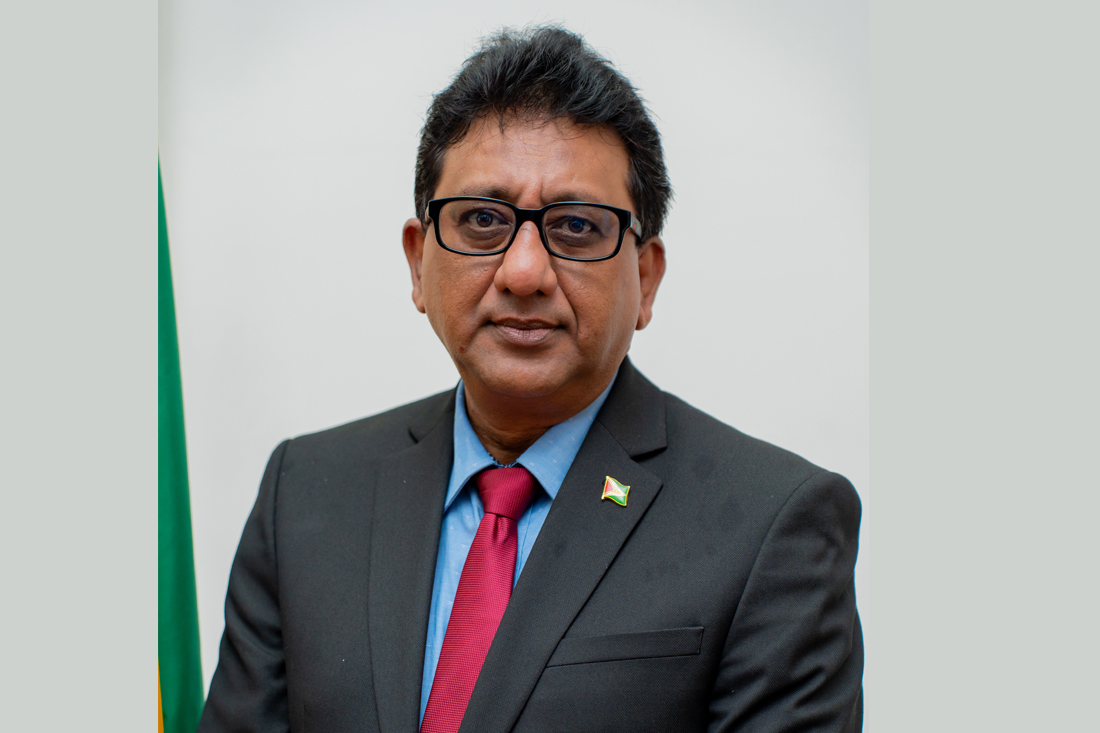
30 Jun Interview with Mohabir Anil Nandlall, Attorney General & Minister of Legal Affairs, Guyana
Guyana is experiencing the fastest growing economy in the world; how is it preparing for increased foreign direct investment?
Guyana is undergoing transformational change across all sectors — economic, infrastructural and social. These developments require a strong legislative and regulatory framework to be fully realized. The Attorney General’s Chambers and Ministry of Legal Affairs play a key role in this, with the attorney general serving as the government’s chief legal advisor. In the health sector, for instance, modern care depends on up-to-date legislation covering areas like mental health, organ transplants, patient data and public health responsibilities. The Public Health Act outlines the duties of the government and regulatory bodies to ensure healthcare meets international standards. It also sets the requirements for healthcare providers to operate legally. Thanks to this legal foundation, leading international healthcare institutions like Northwell and Mount Sinai (USA), as well as Canadian operators, are now active in Guyana’s health system.
Real estate is booming in Guyana, with major operators from the U.S. and Canada now active. To regulate this growth, we introduced modern real estate legislation. In oil and gas, Guyana had no prior experience in production or exploration. Our old regulatory framework was outdated and unfit for a major oil-producing nation. We swiftly enacted the Petroleum Activities Act, which governs the entire lifecycle of oil operations—from expressions of interest to decommissioning. It covers standards, profit-sharing, block allocation, environmental rules and insurance requirements. I am currently finalizing legislation on oil spill preparedness, ensuring clear protocols for prevention, response, liability and compensation.
There has been some controversy in the past regarding the multi-year contract that Guyana signed with ExxonMobil for its hydrocarbon exploitation. Is there a potential renegotiation of this contract?
The existing contract with Exxon includes stability clauses, meaning it can’t be renegotiated without mutual consent. Exxon, having secured a favorable deal, has made it clear they are not interested in renegotiating and it’s unrealistic to expect otherwise from a profit-driven company. However, for future agreements, we have enacted laws that define clear terms for production, profit sharing and rates of return. Standard contracts have been made public, setting non-negotiable benchmarks like royalty rates and profit-sharing terms. While some details remain negotiable, these key elements are fixed. Even critics acknowledge the new terms are fair, though they view the current ones as imbalanced. Still, attempting to renegotiate existing contracts could harm Guyana’s investment climate.
Guyana is seen as a top investment destination not just for its opportunities, but because investors trust the system. That trust stems from a strong regulatory framework, respect for the rule of law and protections for property and individual rights—areas where we have invested heavily. Our judiciary is fully independent, with judges appointed through a transparent process and funded directly from the consolidated fund. Neither the justice minister nor the president has control over the courts. Our three-tier system ends with the Caribbean Court of Justice, based in Trinidad and Tobago. We have also introduced some of the most modern commercial laws in the region. Our Arbitration Act, for example, is based on the United Nations Commission on International Trade Law model, allowing for international-standard arbitration in Guyana with global practitioners.
We recently passed a Condominium Bill modelled on U.S. and Canadian systems, allowing for the development and regulation of condos in Guyana. We also introduced a one-of-a-kind Local Content Act to secure Guyanese participation in the oil and gas sector. Drawing from models in Africa, Norway, Canada, the U.K. and Trinidad, we created a law that mandates certain services — like transport, accommodation and catering — must be provided by locals. This prevents foreign operators from completely dominating the value chain, especially in a sector as specialized and capital-intensive as oil and gas. While technical services can still be sourced internationally, we use a tiered system to ensure local inclusion. For example, local firms handle domestic insurance, while international insurers cover large-scale risks like FPSOs.
We are now amending the law to allow oil and gas contracts to be used as loan collateral, addressing a gap in our banking system where only fixed assets currently qualify. This change will unlock new financing opportunities for local businesses.
We are working with multiple state agencies and international partners — including from the UAE, U.S., Canada and the U.K. — to develop a modern port city in Guyana. This includes new legislation to ensure compliance with international port standards and maritime protections for incoming vessels.Our energy sector remains a top priority. The $10 billion Gas-to-Shore project is one of the largest in the hemisphere, bringing natural gas from 160 miles offshore to produce electricity and cooking gas. We are also exploring our hydroelectric potential — our interior holds hundreds of waterfalls suitable for clean energy development. Guyana’s forests, among the world’s largest untouched reserves, are a key environmental asset. The UN has described them as the “giant air conditioner of the Western Hemisphere.” Vice President Jagdeo pioneered a model where we preserve our forests in exchange for global compensation, recognizing their value to the planet.
While oil and gas are important, our true long-term potential lies in agriculture. With vast arable land and a favorable climate, we can become a major food supplier for the Caribbean. To support this, we are building the necessary legal and regulatory frameworks to meet international food safety and export standards, including those of the World Health Organization and Food and Agriculture Organization.
What framework are you establishing for Guyana’s Low Carbon Development Strategy?
Guyana’s Low Carbon Development Strategy includes the innovative sale of carbon credits — essentially earning revenue for preserving our forests. We were the first country to do this and have already received around $190 million, with 15 percent allocated to indigenous communities and the rest directed toward national development. Major contributors include Norway and European buyers, including airline companies seeking to offset emissions.
We operate a functioning democracy with regular parliamentary sessions and a transparent budgetary process, where all public funds are approved by the National Assembly. Our system follows the British parliamentary model, with elections held every five years. Guyana has a difficult history: 28 years of stolen elections and mismanagement led to economic collapse and mass migration. Today, with a growing economy and renewed stability, we’re working to bring back the diaspora and build a better future.
What financial incentives or frameworks are being implemented to attract indirect investment and are they focused on specific sectors?
We have targeted investment policies to attract different types of investors and encourage development across specific regions of Guyana. I am currently working on a region-specific investment plan that offers tax breaks and land concessions for projects in designated interior and outlying areas. Investors in these regions can access favorable leasing or licensing terms and customized incentives.
Are you implementing any incentives to boost the digital economy, particularly in AI?
We are building a new digital framework, supported by our Data Protection Act, which ensures secure, centralized data collection across all sectors. This data will guide evidence-based decision-making and governance. We are also developing a national resident card, similar to the U.S. Social Security card but more advanced. It will store up to 200 data points, including tax ID, driver’s license, medical info and more. Developed in partnership with the UAE, this card will streamline public and private transactions and could eventually replace the passport. We have passed an Open Data Bill that enables broad data collection and sets a legal framework for governance. We are transitioning all government systems from manual to digital. Courts now use e-litigation — cases are filed and processed online, with virtual hearings even in remote areas.
Prisoners attend court via video link. An e-Transactions Law also allows legal transactions, including property sales, to be done digitally without losing validity. We are building financial platforms to support this shift — cashless payments and credit card use are now widely accepted. We recently launched an electronic ticketing system for speeding, using camera-generated images across the country. When a camera detects a speed limit violation, a ticket is automatically sent to the vehicle owner via WhatsApp, SMS, email and registered mail. You have 14 days to pay via electronic platforms like Moneygram or at the court. You can also contest the ticket.
We are working to fully transition to electronic transactions. Our priority is protecting the interests of the people. While we seek investments, Guyanese interests come first, ensuring fair and transparent benefits from all state activities. We draw guidance from global models in industries like oil and gas, constantly learning and adapting to create the best solutions for our country.
The U.S. remains one of Guyana’s strongest allies. Recently, U.S. Secretary of State Marco Rubio visited and an MoU was signed. Where do you see Guyana’s relationship with the U.S. heading?
Guyana maintains strong relations with the U.S., with half of our population living there, including my family. Our cultural ties are deep and the U.S. is a major investor in our oil and gas sector, with large companies like Bank of America opening offices here. It’s noteworthy that three U.S. secretaries of state from different administrations have visited in less than four years. The U.S. stood by us during our recent elections when attempts were made to steal the results. They took a firm stance, with figures like Marco Rubio and Mike Pompeo issuing statements and threatening visa sanctions against those involved in the fraud. The U.S. has also supported Guyana’s position on Venezuela, making it clear they stand with us on the right side of international law and diplomacy. Our position is solid and the claims against us are baseless and absurd.
What is your final message for Miami Herald readers?
Guyana is one of the most attractive investment and vacation destinations globally. As Secretary of State Marco Rubio noted, it’s one of the few places undergoing significant transformation. While we lack traditional beaches, our unique product — lush forests, nature tours and pristine environments — offers a rare experience.
Iwokrama, a conservation area the size of Great Britain, is managed by an international organization. Our diverse wildlife, rivers, fishing, hunting and rich cultural heritage make Guyana special. We offer a safe environment with strong property protection and a constitution that guarantees equal rights and freedoms for all. Our legal system supports both litigation and alternative dispute resolution methods like arbitration and mediation. In short, Guyana is open for business and the place to be.



Sorry, the comment form is closed at this time.